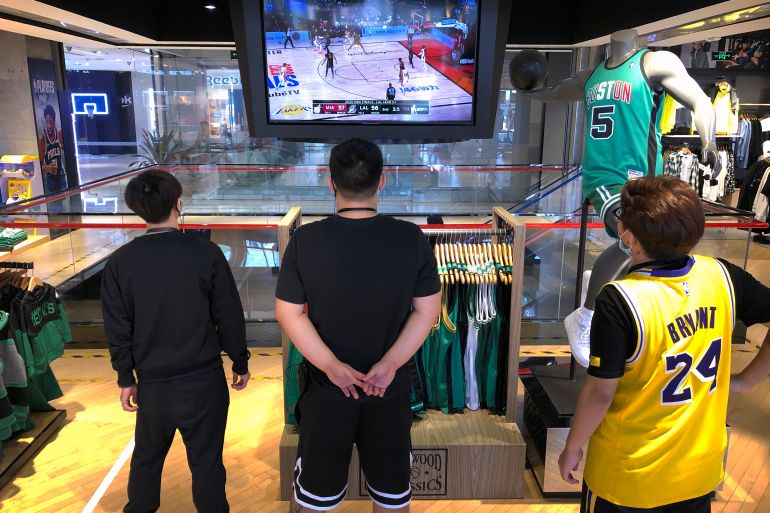NBA returns to Chinese television following Hong Kong blacklist
State broadcaster CCTV stopped airing games in 2020 amid anger over a team official’s support for the Hong Kong democracy movement.

The US’s National Basketball Association (NBA) has returned to Chinese state broadcaster CCTV after being blacklisted for nearly 18 months following a team official’s support for the pro-democracy movement in Hong Kong.
CCTV carried the game between the Los Angeles Clippers and Utah Jazz on Wednesday. The Clippers took victory 121-115.
Keep reading
list of 3 itemsChinese organisers cancel NBA fan event amid free speech row
Nav Bhatia: From Toronto Raptors ‘Superfan’ to NBA Hall of Fame
China is the NBA’s largest overseas market, but Chinese officials took the extraordinary action of suspending the US league from CCTV after the Houston Rockets’ then-general manager, Daryl Morey, tweeted in support of pro-democracy protesters in Hong Kong.
As demonstrations roiled the financial hub in October 2019, Morey tweeted an image bearing a slogan used by the pro-democracy protesters urging the world to “Stand with Hong Kong”.
He later deleted the tweet and apologised, but Chinese business partners and celebrities cut ties with the league after NBA executives defended Morey’s right to freedom of expression.
At the time, a CCTV spokesperson called the decision, which threatened billions of dollars in NBA profits, a “normal broadcast arrangement” and noted the league’s “continued expressions of goodwill” towards China. The national broadcaster did not give a reason for airing the game on Wednesday.
Under an agreement with former colonial ruler Britain, Hong Kong is ruled under a “one country, two systems” model in which it maintains its own government and financial systems. Residents of Hong Kong had for decades enjoyed civil liberties, including freedom of expression, withheld on the mainland.
The agreement expires in 2047, at which time China is expected to take full control of the territory.
In 2019, mass protests broke out across Hong Kong over a proposed law that would allow Beijing to extradite the city’s residents to face charges on the mainland. They soon morphed into a wider pro-democracy movement and an ensuing crackdown that saw thousands of protesters arrested.
In 2020, China passed a wide-ranging national security law that criminalised in Hong Kong any acts considered to support subversion, secession, terrorism or collusion with foreign entities, largely chilling the protest effort.
For its part, the NBA has worked to mend relations with China.
Still, at least one player has been an outspoken critic, with then-Boston Celtics centre Enes Kanter Freedom in October 2021 calling Chinese President Xi Jinping a “brutal dictator” for China’s policies in Tibet. He also urged fellow athletes to boycott last month’s Beijing Winter Olympics in protest against human rights abuses.
China has repeatedly denied allegations of religious repression and other abuses in Tibet, claiming it “peacefully liberated” the far western region in 1951 and has raised living standards with new infrastructure and education policies.